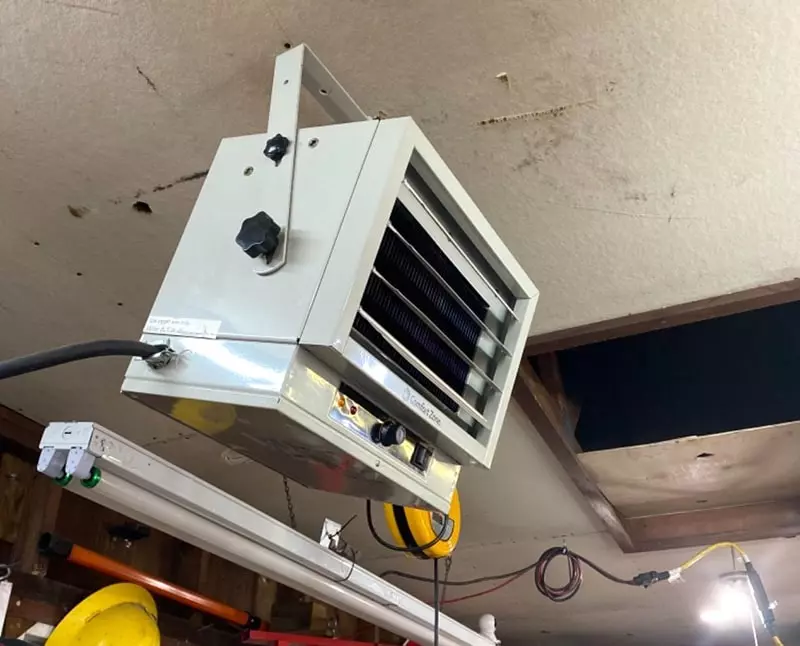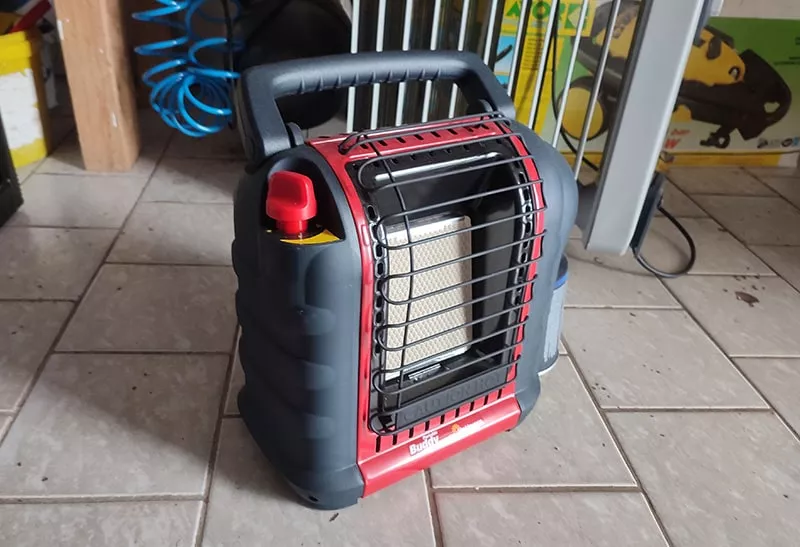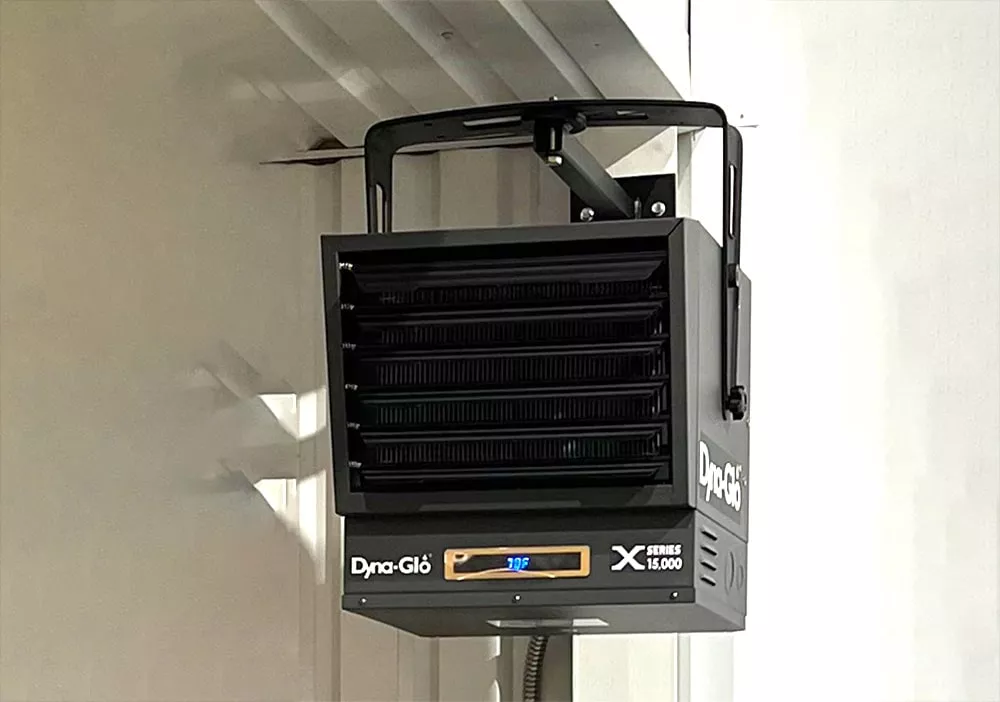Space heaters are usually limited to 1,500 Watts. Especially in the US. That’s because US home circuits are laid out to supply 120 Volts. Combined with a 15 Ampere fuse, that corresponds to a maximum power consumption of
120 Volts × 15 Amps = 1,800 Watts
So, the average US household circuit can support 1,800 Watts. But since you want to run multiple devices simultaneously, and not just a single heater, space heaters cap at 1,500 Watts.
That’s the story behind the 1,500 Watts limit.
But, of course, if you take the time to have a closer look, there are a few space heaters that output more than 1,500 Watts of heat.
I’ve picked some for you.
Which Space Heaters Output More Than 1,500 Watts?
Looking for space heaters over 1,500 Watts, they are really hard to find. Indoor household space heaters max out at 1,500 Watts. So, to find space heaters over 1,500 Watts, we have to shift the search a bit.
There are two types of heaters that are stronger than 1,500 Watts:
- Heavy-duty electric heaters: These electric heaters usually require a hardwire installation by an electrician, because you have to “workaround” the limitations of the standard US circuit. Heavy-duty electric heaters are costly to install and run.
- Fuel-based heaters (Gas, Diesel, Wood): Fuel-based space heaters are not limited by the electric grid’s capacity. Gas and diesel heaters can easily output over 5,000 Watts. Wood stoves are even stronger.
In this article, we’ll first check out some electric space heaters stronger than 1,500 Watts (which is probably what you were looking for). You will see that these are suboptimal heaters in many cases because they are just so freaking expensive.
Then, we’ll complete the list with two propane gas heaters that output 5,000 Watts and 8,000 Watts respectively. If you haven’t considered gas heaters before, now is the opportunity to do so.
So, let’s have a look at these extra-strong heaters and what you need to do to be able to run them:
Electric Space Heaters Stronger than 1,500 Watts
1. Comfort Zone CZ220 (5,000 Watts)
The Comfort Zone CZ220 (click to view it on amazon) is a powerful 5,000-watt garage heater.
I ranked this one the #1 electric heater over 1,500 Watts because it is very durable. The full steel case protects it from heat and impact.

I wouldn’t be surprised if this heater lasts you 20 years or more.
It is a very strong heater. But because it outputs so much heat, you can’t run it off an ordinary wall outlet. The Comfort Zone CZ220 needs a hardwire installation into a single-phase 240 Volt circuit. Most people hire an electrician to install it for them.
Once it’s installed, the Comfort Zone heater is practically maintenance-free. Since it runs on electricity alone, it never needs refills (like a fuel-based heater). And because the only moving part inside it is a fan, the only noise it creates is a blowing noise.
2. NewAir G56 (5,600 Watts)
This one is a bit cheaper than the comfort zone, but you cannot ceiling-mount it as nicely. My second recommendation is the NewAir G56 (click to view it on amazon).
Overall, it doesn’t really matter whether you get the Comfort Zone or this one. It’s just a small price difference. Both are hardwired heaters. The Comfort Zone is, however, better rated.
You can’t really do anything wrong with either of them.
Just pick the one you like most.
How Expensive are 5,000 Watt Electric Heaters To Run?
To be honest, while writing these recommendations, I feel the need to emphasize something.
Electric space heaters are very expensive to run. Even a regular-sized 1,500 Watts heater costs you over $50 a month if you run it for 8 hours a day, every day.
So, a 5,000-watt heater, which is about 3 to 4 times as strong as a regular space heater, will give you a hefty electricity bill of $150 - $200 if you run it for 8 hours every day.
A single hour of 5,000 Watt-heating will cost you $0.85 (assuming an average electricity rate of 17 cents per kWh).
And, in my opinion, that is rarely a reasonable decision. Please only get an electric heavy-duty space heater (stronger than 1,500 Watts) if you are absolutely sure there’s no better option.
If I made you doubt your own decision, good.
Electric heaters are rarely the best choice for heating. Instead, a small wood stove, or a natural gas (NG) or liquid propane (LP) heater is usually better.
So, let’s continue with my real recommendations for strong heaters.
Propane Heaters Stronger Than 1,500 Watt Space Heaters
I really enjoy using propane heaters. They output well above 1,500 Watts of heating power. A small, portable propane heater is usually up to 3x as strong as a regular electric space heater. And running a propane heater costs just a fraction of the running cost of an electric heater.
Here are my propane heater recommendations:
3. Mr. Heater Big Buddy (18,000 BTU/h = 5,250 Watts)
The Mr. Heater Big Buddy (click to view it on amazon) is my favorite portable propane heater. It outputs 18,000 BTU (British Thermal Units) per hour, which is equivalent to 5,250 Watts.
The biggest advantage of the Mr. Heater Big Buddy, when compared to an electric space heater is that it does not require any installation. It does not even need electricity to run, which makes it a great emergency heater.
And another advantage is, of course, the reduced running cost.
Heat from propane gas is about 70% cheaper than heat from electricity.
However, beware that burning propane gas produces some humidity. So, with a propane heater, you will have to vent regularly.

4. Dyna-Glo Wall-mounted Heater (30,000 BTU/h = 8,800 Watts)
This Dyna-Glo wall-mounted heater (click to see it on amazon) is a very powerful propane heater. Its heat output is 30,000 BTU/h, which is equivalent to 8,800 Watts.
So, this one is great for everybody looking to heat large or uninsulated spaces, such as garages, basements, or workshops.
Since this model is wall-mounted, it takes up no floor space, which I particularly like.
Also, just like the Mr. Heater Big Buddy, the Dyna-Glo requires no installation, aside from mounting it to the wall and hooking it up with a propane tank.
It runs completely without electricity, which makes it a worthy emergency heater. Just like the Mr. Heater Big Buddy, you will need to vent occasionally to get rid of humidity from the propane combustion.
Diesel Heaters
Diesel heaters are also stronger than 1,500 Watts. However, since they are usually used in RVs (camper vans, motorhomes, etc.), I decided not to list them here explicitly.
If you’re interested in diesel heaters, check out this guide on RV diesel heaters.
Wood Stoves
Of all heaters that output more than 1,500 Watts, a wood stove is probably the most obvious one.
When I was trekking in the Himalayas, the locals fired up their wood stoves to temperatures to sauna-like temperatures for one hour a day to dry out their homes.
Wood stoves involve a lot of work, most of which is firewood chopping, stacking, and drying. Good quality wood is what separates a good, efficient burn from a wood-devouring waste of money.
For you, looking for a strong heater, a wood heater is probably not what you want. But if you are interested, have a look at my guide on the best tiny house heaters, where I recommend a small wood stove.
Conclusion
Electric heaters stronger than 1,500 Watts are expensive to run. My #1 recommendation is the 5,000-watt Comfort Zone CZ220 garage heater. It outputs a full 5,000 Watts.
However, be aware that heavy-duty electric heating is very expensive and can cost you several hundred dollars a month, depending on usage.
If you can avoid getting such an electric heater, get a propane heater instead. Their heat output is not limited by your home’s electric circuitry. Propane heaters safely output very high heat levels. On a propane heater, 1,500 Watts is the “low” setting, while regular household space heaters max out at 1,500 Watts.
And on top of that, propane heat is much cheaper than electric heat.
Overall, propane heaters are generally the better choice of space heater type when you need a lot of heat.
You need to evaluate your situation and see which space heater over 1,500 Watts suits you better: An electric heater over 1,500 Watts that requires professional installation, but no refills, or a propane heater that requires no installation but needs propane tank refills.
